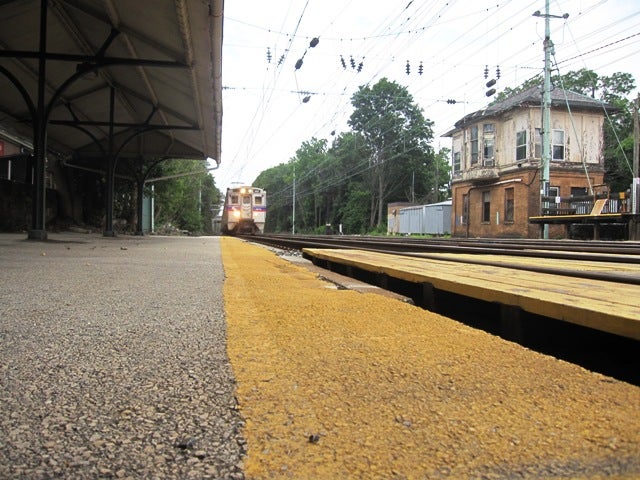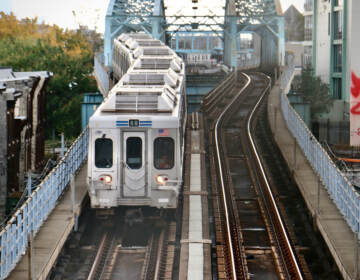SEPTA’s new budget challenges

Thanks to recession and toll problems, agency can’t count on subsidies to sustain its capital improvement and repair plan. Pension fund has also taken big hit.
July 17, 2009
By Anthony Campisi
For PlanPhilly
Even after Harrisburg resolves a budget impasse that threatens to bring Pennsylvania government to a halt, it will still have to deal with an impending crisis in the state’s transportation funding formula.
If nothing is done, state money devoted to highway maintenance and transportation subsidies will be cut by $400 million starting in the next fiscal year, endangering the budgets of public transit agencies and highway maintenance efforts.
Act 44, which was passed in July 2007 to guarantee a stable source of funding for highway repairs and transit agencies, relies on funding from bonds drawn against future toll revenue from the Pennsylvania Turnpike and Interstate 80. It was projected to provide an average of $946 million a year for transportation improvement projects.
However, because the Federal Highway Administration denied Pennsylvania’s request to toll I-80, the funds — projected to be $850 million this year and scheduled to increase by 2.5 percent every year after that — will face drastic cuts.
And though Rich Kirkpatrick, a spokesman for the Pennsylvania Department of Transportation, said that he was unaware of any plans to resubmit the request to toll I-80 — he said that “the specifics of the Pennsylvania plan just did not fit with federal law” — funding will be cut to only $450 million a year, with $250 million reserved for mass transit agencies and $200 million for highways.
If this occurs, SEPTA will lose about $110 million a year for its capital budget. But unlike previous funding crises for SEPTA, this time it may be more difficult to rally support behind a solution to replace Act 44 money.
Other SEPTA crises are focused around the authority’s operating budget. SEPTA, in essence, would protest that it didn’t have enough money to continue operating without either instituting ruinous cutbacks or getting more money from the state.
That’s precisely the sort of crisis that led to the passage of Act 44 in the first place — without a funding solution, SEPTA would have been forced to essentially begin “the dismantling” of its system, according to a SEPTA spokesman at the time.
But this time around, because this crisis will hit the capital budget rather than the operating budget, which pays employee salaries and ensures the day-to-day running of the system, SEPTA won’t have to make any drastic service cuts — at least at first.
Instead, SEPTA will have to abandon much of its capital improvement plans and may have to draw from its operating budget to complete projects for which the authority has already signed contracts, like the delivery of 120 new Silverliner V regional rail cars. This will cause “a little bit of an invisible crisis,” said Richard P. Voith, a senior vice president at Econsult Corp., a public-policy consulting group, and a former vice chairman of the SEPTA board.
This, in turn, will eventually defeat one of the main purposes of Act 44: to provide a decade’s worth of stable operating funding for SEPTA. Voith, who served on the Transportation Funding and Reform Commission that analyzed transportation funding solutions for Gov. Rendell, estimates that it will cut that 10-year window in half, forcing SEPTA to go back to Harrisburg for more operating funds and returning it to the budgetary instability with which it has been plagued since its founding in 1963.
“It takes a toll on the organization” if you have continual crises, Voith said, noting that the private sector was reluctant to invest in smart-growth development policies, like building around SEPTA regional rail lines, because of uncertainty about the quality of future service.
There’s evidence that the current fiscal uncertainty is already affecting SEPTA’s long-term planning ability. This year’s operating budget lacks a five-year forecast or any indications of how the authority will have to alter its planned projects if funding is cut.
Additionally, it’s unclear what help the Service Stabilization Fund will have in helping SEPTA recoup its losses.
Rainy Day Fund has dried up
The rainy day fund, established by Act 44, is supposed to provide a financial cushion for the authority’s operating budget when state subsidies don’t cover all the year’s costs. SEPTA put $90 million in it in fiscal year 2008, but it currently has no value, according to SEPTA CFO and treasurer Richard Burnfield.
It’s been drained to cover late payments from the state in last year’s budget and to cover operating expenses until Harrisburg passes the current budget.
“I’ve got to meet payroll,” he said.
Like most government agencies, SEPTA’s pension fund has also been hit by the recession. It dropped from $800 million to about $560 million as of last quarter.
Burnfield said that it will take a “sustained and long-term recovery to get back to where we were,” and that SEPTA has increased the amount of money it sets aside for the pension fund this fiscal year.
Build support network
But the future might not be all bad. Feather Houstoun, president of the William Penn Foundation and a former SEPTA CFO, points out that SEPTA has worked hard over the past several years to build relationships with regional organizations that can lend political support in Harrisburg when the time comes to fight for state funding.
She said that a focus of SEPTA in the early and mid-1990s, when she was at the authority, was to convince organizations like the Philadelphia Chamber of Commerce and the Center City District of its value for regional economic development.
“It’s going to take some very thoughtful positioning on the issue,” Houstoun said, though she added that she believes that SEPTA general manager Joseph M. Casey has worked hard to continue rebuilding relations with the city and others with political heft in Harrisburg.
The key, she said, is to frame the issue as one of transportation as a whole — Act 44 was meant to be a comprehensive response to highway and public transportation needs in part because support for public transportation alone hasn’t always been forthcoming in the state legislature.
Capital concerns
Even assuming that Act 44 funding is restored somehow, SEPTA still won’t have enough money to complete its future capital plans.
When Act 44 was passed, the state decided to allocate enough money to bring transportation infrastructure up to a state of good repair. For SEPTA to make the capital investments to build a truly state-of-the-art system would require its capital budget to increase by about $200-400 million a year, Burnfield said.
SEPTA is hoping that some money for its capital program will come from the federal New Starts program, which the authority hopes will be rewritten in the new transportation reauthorization bill to allow older systems like SEPTA access to funds for service expansion.
Transportation advocates are also hoping for some sort of regional tax that the five counties served by the agency can impose to fund new capital projects. Most new transit agencies in cities like Denver and Salt Lake City built their systems on the basis of regional taxation schemes, though it might be a hard sell to taxpayers who already have a system in place.
PenTrans, a public transportation advocacy group, is proposing a half-cent sales tax for the region to be tacked on as part of Philadelphia’s attempt to temporarily raise the city sales tax to close its budget hole.
“The majority of [new mass transit] projects have been funded regionally or locally” throughout the country, Burnfield said.
And Voith of Econsult said that more highway tolling is inevitable if the state wants to address its long-term infrastructure needs.
As for Act 44, indications are that the authority will wait until the current year’s budget is passed before it begins the fight to keep its current funding levels, though Peter Javsicas, the PenTrans executive director, said that he “was surprised at SEPTA’s seeming complacency in the face of the current situation.”
“I think they feel that … with the budget being up in the air and with no resolution in site, this is not the time for them to be agitating publicly,” he added.
Contact the reporter at campisi.anthony@gmail.com
ON THE WEB:
http://www.septa.com/inside/reports/5year_plan.pdf — for the five-year plan
http://www.septa.com/inside/reports/FY10OperatingBudget_Proposed_Internet.pdf — for the operating budget
http://www.septa.com/inside/reports/CB10_Budget_Proposed_Internet.pdf — for the capital budget
WHYY is your source for fact-based, in-depth journalism and information. As a nonprofit organization, we rely on financial support from readers like you. Please give today.






